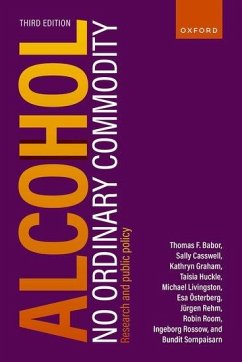Thomas F. Babor (Professor, Department of Public Health Sciences, P, Sally Casswell (SHORE Professor & College Whariki Research Centre, Kathryn Graham (Institute for Mental Health Pol Scientist Emeritus
Alcohol: No Ordinary Commodity
Research and Public Policy
Thomas F. Babor (Professor, Department of Public Health Sciences, P, Sally Casswell (SHORE Professor & College Whariki Research Centre, Kathryn Graham (Institute for Mental Health Pol Scientist Emeritus
Alcohol: No Ordinary Commodity
Research and Public Policy
- Broschiertes Buch
- Merkliste
- Auf die Merkliste
- Bewerten Bewerten
- Teilen
- Produkt teilen
- Produkterinnerung
- Produkterinnerung
An examination of the global impact of alcohol misuse, the current state of alcohol policy and research, and the effectiveness different strategies and interventions, written by leaders in the field of addiction science.
Andere Kunden interessierten sich auch für
![Value and the Media Value and the Media]() Goran BolinValue and the Media80,99 €
Goran BolinValue and the Media80,99 €![Health Inequalities Health Inequalities]() Health Inequalities105,99 €
Health Inequalities105,99 €![Oxford Handbook of Occupational Health 3e Oxford Handbook of Occupational Health 3e]() Oxford Handbook of Occupational Health 3e55,99 €
Oxford Handbook of Occupational Health 3e55,99 €![What Is Global History ? What Is Global History ?]() Sebastian ConradWhat Is Global History ?24,99 €
Sebastian ConradWhat Is Global History ?24,99 €![Principles of Commodity Economics and Finance Principles of Commodity Economics and Finance]() Daniel P. Ahn (United States Department of State)Principles of Commodity Economics and Finance41,99 €
Daniel P. Ahn (United States Department of State)Principles of Commodity Economics and Finance41,99 €![The Political Economy of International Commodity Cartels The Political Economy of International Commodity Cartels]() Elina KuorelahtiThe Political Economy of International Commodity Cartels44,99 €
Elina KuorelahtiThe Political Economy of International Commodity Cartels44,99 €![The Currency of Politics The Currency of Politics]() Stefan EichThe Currency of Politics21,99 €
Stefan EichThe Currency of Politics21,99 €-
-
-
An examination of the global impact of alcohol misuse, the current state of alcohol policy and research, and the effectiveness different strategies and interventions, written by leaders in the field of addiction science.
Hinweis: Dieser Artikel kann nur an eine deutsche Lieferadresse ausgeliefert werden.
Hinweis: Dieser Artikel kann nur an eine deutsche Lieferadresse ausgeliefert werden.
Produktdetails
- Produktdetails
- Verlag: Oxford University Press
- 3 Revised edition
- Seitenzahl: 384
- Erscheinungstermin: 28. Februar 2023
- Englisch
- Abmessung: 226mm x 163mm x 23mm
- Gewicht: 584g
- ISBN-13: 9780192844484
- ISBN-10: 0192844482
- Artikelnr.: 66729371
- Herstellerkennzeichnung
- Libri GmbH
- Europaallee 1
- 36244 Bad Hersfeld
- gpsr@libri.de
- Verlag: Oxford University Press
- 3 Revised edition
- Seitenzahl: 384
- Erscheinungstermin: 28. Februar 2023
- Englisch
- Abmessung: 226mm x 163mm x 23mm
- Gewicht: 584g
- ISBN-13: 9780192844484
- ISBN-10: 0192844482
- Artikelnr.: 66729371
- Herstellerkennzeichnung
- Libri GmbH
- Europaallee 1
- 36244 Bad Hersfeld
- gpsr@libri.de
Thomas F. Babor is an Emeritus Professor and former Chairman in the Department of Public Health Sciences, University of Connecticut School of Medicine. He served as Head of Social Science Research at McLean Hospital's Alcohol and Drug Abuse Research Center in Belmont, Massachusetts. In 1977, he received a Research Scientist Development Award from the National Institute on Alcohol Abuse and Alcoholism. In 1982 he moved to the University of Connecticut School of Medicine where he was the Scientific Director of the Alcohol Research Center and Interim Chair of the Department of Psychiatry. He has worked with the World Health Organization on the development of Alcohol Use Disorders Identification Test (AUDIT) and the Alcohol, Substance Involvement Screening Test (ASSIST). He is also Editor-in-Chief of the Journal of Studies on Alcohol and Drugs. Sally Casswell is Director of a WHO Collaborating Centre and Co-director of SHORE & Whariki Research Centre, Massey University, New Zealand. Her research interests are in social and public health policy in relation to alcohol and other commodities. She was selected by her peers to receive the Jellinek Memorial Award, the premier international award for alcohol research, for her contributions to 'the understanding of social and cultural drinking patterns and public attitudes' and is a Fellow of the Royal Society of New Zealand. She has published more than 200 articles in peer reviewed international journals, is a member of the World Health Organisation's Expert Advisory Panel on Alcohol and Drug Dependence and the Strategic and Advisory Group, NCDs and is Chair of the Global Alcohol Policy Alliance. Kathryn Graham is a Senior Scientist Emeritus and Adjunct Professor. The hallmark of Dr. Graham's research has been a focus on community. She is known for her contributions to understanding and preventing alcohol-related violence, including: the Safer Bars program; "Raising the Bar", a landmark book on preventing violence in drinking venues; the use of observational and street intercept approaches to study bar violence; highlighting the impact of sexual aggression in bars; and leading analyses on intimate partner violence in a multi-country project on gender, culture and alcohol. She was founding editor of the International Journal of Alcohol and Drug Research and has worked with community services and stakeholders to develop a systems approach to addressing complex needs of persons with co-occurring addiction, mental health and violence problems. For her accomplishments in developing research-driven community interventions, she was awarded the Queen's Golden Jubilee Medal in 2002. Taisia Huckle is a senior researcher whose research focuses on evidence-based alcohol and public health research to address alcohol-related harm. The major focus has been on original research and knowledge transfer in her areas of research expertise- alcohol consumption and harms, alcohol policy, and alcohol's harm to others. Dr Huckle has published numerous journal articles on alcohol use and has contributed to two World Health Organisation books. She is a Deputy Editor for Drug and Alcohol Review, an international peer reviewed journal, and regularly reviews manuscripts for high impact journals. She has been an invited speaker at national events, presented evidence in Alcohol Regulatory Licensing Authority hearings and regularly presents papers at national and international conferences. She currently has a Sir Charles Hercus Fellowship funded by the Health Research Council of New Zealand. Michael Livingston is an epidemiologist and public health researcher working at the National Drug Research Institute at Curtin University. Dr Livingston has published widely on alcohol policy, alcohol consumption, and alcohol-related harm, making particular contributions to research into the impacts of liquor licensing policies on alcohol problems and on youth drinking trends. He has published over 150 papers and been awarded a series of highly competitive fellowships from major Australian research funders. Livingston's work has had substantial impact on policy in Australia and internationally and has been recognised via prizes from the Australian National Health and Medical Research Council, The Kettil Bruun Society for Social and Epidemiological Research on Alcohol and Research Australia. Esa Österberg is a senior researcher at the Alcohol, Drugs and Addiction department of the National Institute for Health and Welfare in Helsinki, Finland. Prior to this he worked as a researcher at the Social Research Institute of Alcohol Studies and as a senior researcher at the Alcohol and Drug Research Group of the National Research and Development Centre for Welfare and Health. Dr Österberg participated in the 'European Comparative Alcohol Study' in the late 1990s and coordinated the alcohol policy task force of the Eurocare project Bridging the Gab(BtG). Currently he is part of the projects 'Alcohol Measures for Public Health Research Alliance' (AMPHORA) and 'Standardizing Measurement of Alcohol Related Troubles' (SMART). Jürgen Rehm is Senior Scientist in the Institute for Mental Health Policy Research and in the Campbell Family Mental Health Research Institute at CAMH. He is Professor and was the Inaugural Chair of Addiction Policy in the Dalla Lana School of Public Health at the University of Toronto, and holds professorships and positions in Germany, Spain and Russia. Dr Rehm has been a leader in generating and analyzing the scientific data needed to inform clinicians and policy-makers of strategies to reduce alcohol-, tobacco-, and other drug-attributable harm. His recent research has increasingly included interactions between socio-economic status, poverty, and substance use, including analysis of policies and interventions with respect to reducing or increasing inequalities. His was awarded the Jellinek Memorial Award in 2003, the European Addiction Research Award in 2017, and the (Inaugural) Kettil Bruun Society Award for Advancement of International Research Collaboration in 2021. Robin Room is a sociologist who worked for many years in alcohol and drug studies in the U.S., Canada, Norway, and Sweden. Returning to Australia in 2006, he was until 2017 the Director of the Centre for Alcohol Policy Research (CAPR), initially at the School of Population and Global Health, University of Melbourne, and Turning Point Alcohol and Drug Centre, and after 2015 at La Trobe University, Melbourne. He continues as a Distinguished Professor at CAPR, La Trobe University, and with a part-time appointment at Stockholm University, Sweden. He has worked on social, cultural, and epidemiological studies of alcohol, drugs, and gambling behaviour and problems, and studies of social responses to alcohol and drug problems and of the effects of policy changes. Ingeborg Rossow is Research Professor in the Department of Alcohol, Tobacco, and Drugs, Norwegian Institute of Public Health, Oslo, Norway. She is a member of the World Health Organization's expert advisory panel on Drug Dependence and Alcohol Problems and has served on the United Nations Office on Drugs and Crime's advisory expert panel on international standards for drug prevention. Her research activities include epidemiological studies of alcohol and drug use, health and social consequences of substance use, and research on alcohol and drug policy. Bundit Sornpaisarn is a scholar who has worked in the fields of alcohol policy for almost 20 years. His research interest covers the situational analyses and surveillance of alcohol consumption and its related harms, alcohol control intervention research, and alcohol policy evaluation (including alcohol taxation and pricing policies). He has researched alcohol taxation in various aspects: tax method and tax system design; the impacts of taxation on alcohol price, consumption, and harms; and policy process and politics of alcohol taxation. He is the lead editor and one of the co-authors of the book Resource tool on alcohol taxation and pricing policies, published by the World Health Organization (WHO).
* 1: Setting the Policy Agenda
* 2: Alcohol: No Ordinary Commodity
* 3: Alcohol Consumption Trends and Patterns of Drinking
* 4: The Burden of Alcohol Consumption
* 5: The Alcohol Industry: A Nexus of Considerable Influence
* 6: Overview of Strategies and Interventions to Prevent and Reduce
Alcohol-Related Harm
* 7: Controlling Affordability: Pricing and Taxation Strategies
* 8: Regulating the Physical Availability of Alcohol
* 9: Restrictions on Marketing
* 10: Education and Persuasion Strategies
* 11: Drinking and Driving Prevention and Countermeasures
* 12: Modifying the Drinking Context: Reducing Harm in the Licensed
Drinking Environment and Other Contexts
* 13: Treatment and Early Intervention Services
* 14: The Policy Process: Multiple Stakeholders, Multiple Agendas
* 15: Economic Interests, Public Health Priorities and the Global
Governance of Alcohol
* 16: Alcohol Policies: A Consumer's Guide
* Bibliography
* Glossary
* Online Appendix 1: Guidelines Used for Rating Strategies and
Interventions Evaluated in Chapters 7-13
* Online Appendix 2: Supplement to Chapter 12: Tables A12.1 to A12.4
* 2: Alcohol: No Ordinary Commodity
* 3: Alcohol Consumption Trends and Patterns of Drinking
* 4: The Burden of Alcohol Consumption
* 5: The Alcohol Industry: A Nexus of Considerable Influence
* 6: Overview of Strategies and Interventions to Prevent and Reduce
Alcohol-Related Harm
* 7: Controlling Affordability: Pricing and Taxation Strategies
* 8: Regulating the Physical Availability of Alcohol
* 9: Restrictions on Marketing
* 10: Education and Persuasion Strategies
* 11: Drinking and Driving Prevention and Countermeasures
* 12: Modifying the Drinking Context: Reducing Harm in the Licensed
Drinking Environment and Other Contexts
* 13: Treatment and Early Intervention Services
* 14: The Policy Process: Multiple Stakeholders, Multiple Agendas
* 15: Economic Interests, Public Health Priorities and the Global
Governance of Alcohol
* 16: Alcohol Policies: A Consumer's Guide
* Bibliography
* Glossary
* Online Appendix 1: Guidelines Used for Rating Strategies and
Interventions Evaluated in Chapters 7-13
* Online Appendix 2: Supplement to Chapter 12: Tables A12.1 to A12.4
* 1: Setting the Policy Agenda
* 2: Alcohol: No Ordinary Commodity
* 3: Alcohol Consumption Trends and Patterns of Drinking
* 4: The Burden of Alcohol Consumption
* 5: The Alcohol Industry: A Nexus of Considerable Influence
* 6: Overview of Strategies and Interventions to Prevent and Reduce
Alcohol-Related Harm
* 7: Controlling Affordability: Pricing and Taxation Strategies
* 8: Regulating the Physical Availability of Alcohol
* 9: Restrictions on Marketing
* 10: Education and Persuasion Strategies
* 11: Drinking and Driving Prevention and Countermeasures
* 12: Modifying the Drinking Context: Reducing Harm in the Licensed
Drinking Environment and Other Contexts
* 13: Treatment and Early Intervention Services
* 14: The Policy Process: Multiple Stakeholders, Multiple Agendas
* 15: Economic Interests, Public Health Priorities and the Global
Governance of Alcohol
* 16: Alcohol Policies: A Consumer's Guide
* Bibliography
* Glossary
* Online Appendix 1: Guidelines Used for Rating Strategies and
Interventions Evaluated in Chapters 7-13
* Online Appendix 2: Supplement to Chapter 12: Tables A12.1 to A12.4
* 2: Alcohol: No Ordinary Commodity
* 3: Alcohol Consumption Trends and Patterns of Drinking
* 4: The Burden of Alcohol Consumption
* 5: The Alcohol Industry: A Nexus of Considerable Influence
* 6: Overview of Strategies and Interventions to Prevent and Reduce
Alcohol-Related Harm
* 7: Controlling Affordability: Pricing and Taxation Strategies
* 8: Regulating the Physical Availability of Alcohol
* 9: Restrictions on Marketing
* 10: Education and Persuasion Strategies
* 11: Drinking and Driving Prevention and Countermeasures
* 12: Modifying the Drinking Context: Reducing Harm in the Licensed
Drinking Environment and Other Contexts
* 13: Treatment and Early Intervention Services
* 14: The Policy Process: Multiple Stakeholders, Multiple Agendas
* 15: Economic Interests, Public Health Priorities and the Global
Governance of Alcohol
* 16: Alcohol Policies: A Consumer's Guide
* Bibliography
* Glossary
* Online Appendix 1: Guidelines Used for Rating Strategies and
Interventions Evaluated in Chapters 7-13
* Online Appendix 2: Supplement to Chapter 12: Tables A12.1 to A12.4








